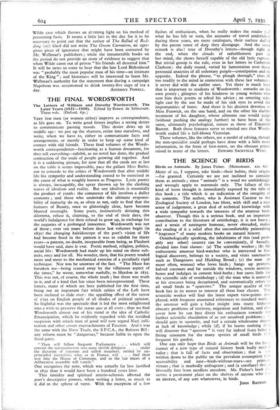THE SCIENCE OF BIRDS
Birds as Animals. By James Fisher. (Heinemann. 12s. 6d.) MOST of us, I suppose, take birds—their habits, their origins —for granted. Certainly we are not inclined to consider them as animals ; since " animals " is a word we unthinkingly and wrongly apply to mammals only. The fallacy of this kind of loose thought is immediately exposed by the title of this book ; a title which is an indication of the integrity of its contents. The author, who is Assistant Curator to the Zoological Society of London, has blent, with skill and a nice sense of judgement, a great deal of technical knowledge with a wide sympathy towards the interests of the amateur bird- observer. Though this is a serious book, and an important contribution to the literature of ornithology, it is not heavy ; and a strain of astringent humour, never obtruded, makes the reading of it a relief after the uncomfortably painstaking " fragrance " of many modem books on natural history.
Ornithologically speaking, the inhabitants of this (and prob- ably any other) country can be conveniently, if broadly, divided into four classes : (a) The scientific worker ; (b) the enthusiastic amateur bird-watcher who is interested in bio- logical discovery, belongs to a society, and visits sanctuaries such as Dungeness and Hickling Broad ; (c) the man (or more often, woman) who loves birds ; hangs up peanuts, halved coconuts and fat outside the windows, erects nesting- boxes and indulges in cement bird-baths ; but cares little for the scientific side of ornithology ; (d) the man who is annoyed at his crocuses being decapitated, and automatically refers to all small birds as " sparrows." The unique quality of this book lies in its power to interest all these four classes. The scientific worker will find the latest expert view-points chi- played, with frequent annotated references to standard work, : the amateur will gain a fuller insight into many hitherto obscure problems of territory, migration and habitat, and dis- cover how he can best direct his enthusiasm towards the further scientific elucidation of as yet unsolved problems ; should gain in austerity, and feel a certain wholesome shame at lack of knowledge ; while (d), if he learns nothing el,:, will discover that " sparrow " is very far indeed from being 3 fitting synonym for the many species of small birds th it frequent his garden.
One can only hope that Birds as Animals will be the for:- runner of a new type of natural history book badly needed today ; that is full of facts and observation ; that is rot written down to the public on the prevalent assumption that accessibility and ease—birds-without-tears—are primly.," virtues ; that is markedly unfragrant ; and (a corollary) that 3 blessedly free from needless anecdote. Mr. Fisher's book d=- serves a permanent place on the shelves of anyone who hi- an interest, of any sort whatsoever, in birds.
Joan RAYNOR.










































 Previous page
Previous page